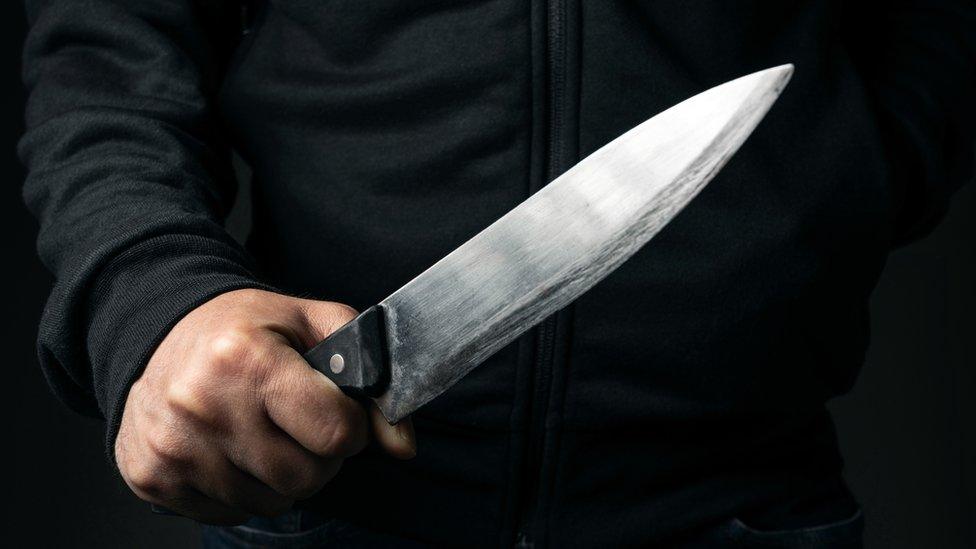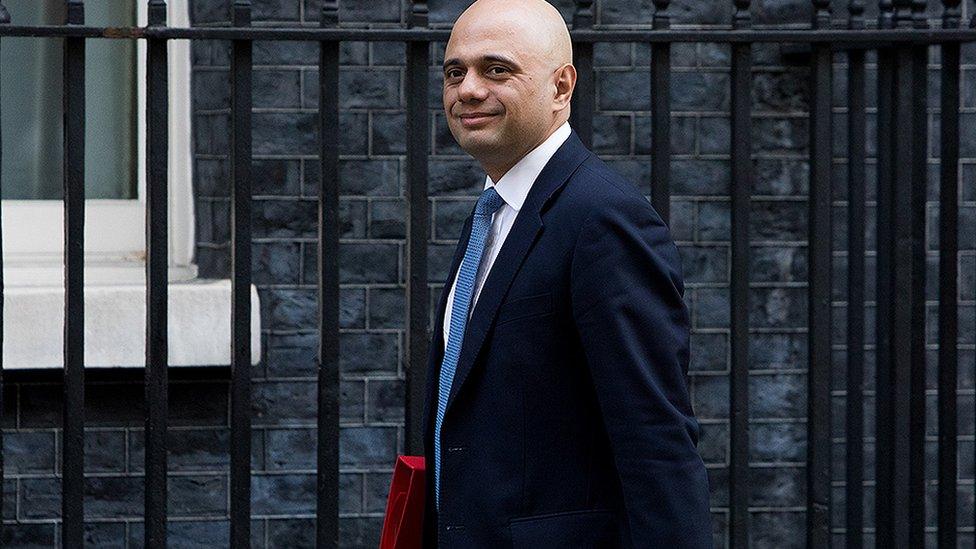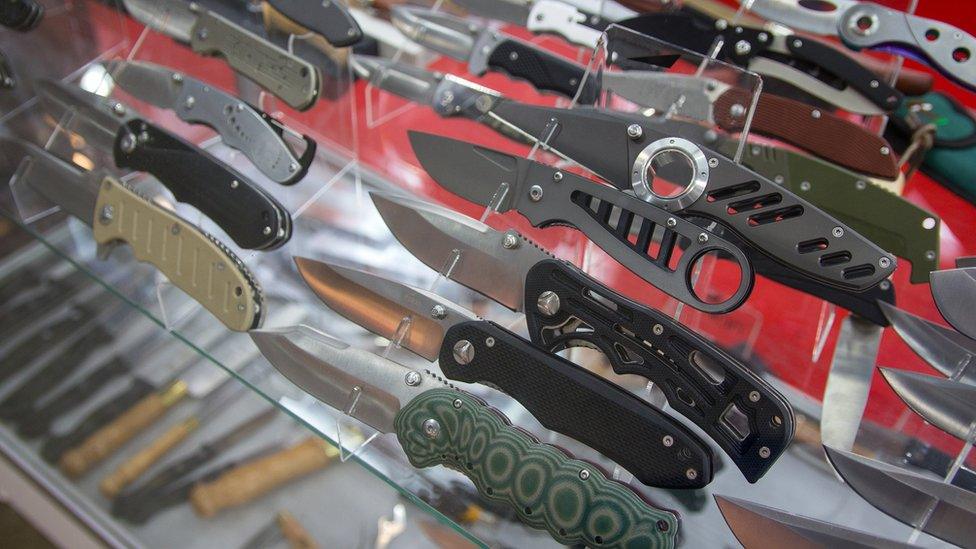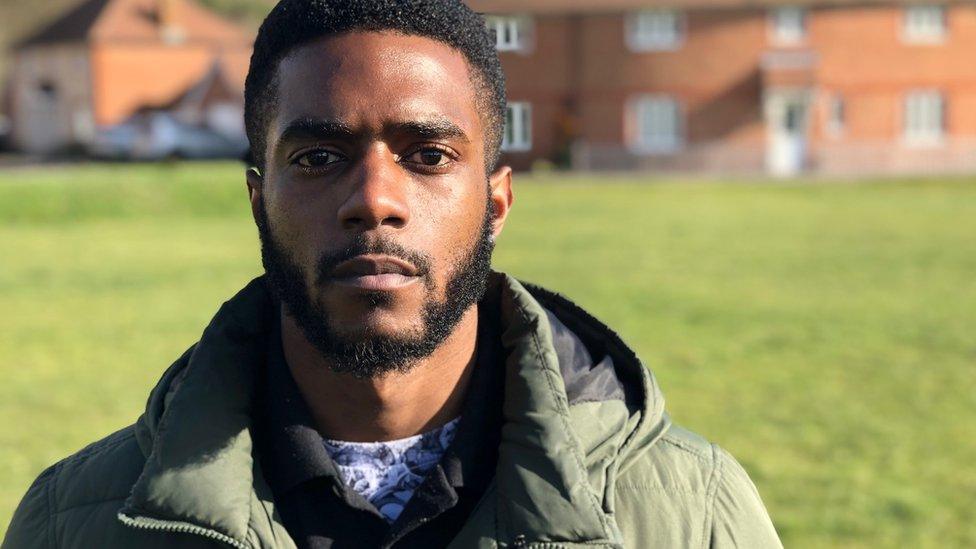Home secretary: 'Sweep the net, take down knife-crime posts'
- Published

Sajid Javid, the home secretary, wants to introduce new laws to stop social media being used to fuel knife crime.
He's told Newsbeat he doesn't have what he needs to crack down on things that fuel gang disputes - despite the laws which exist to remove terrorism content and child sex abuse images from online.
"A couple of years back the internet companies were not taking it seriously enough to remove this content from the internet," says Sajid Javid.
He wants them to do more.
The home secretary says he told major online brands that they need to introduce better tools to monitor content which could result in criminal activity, like knife crime.
'Internet companies need to use their own tech to do more'
"After lots of pressure from this government and the US government I went over to the US myself and spoke to the five tech giants.
"I said you need to do more, use your own technology to sweep the 'net and find these videos and take them down.
"They are doing an incredible job today and I want to see them employing the same emphasis to that [knife and gang-related] content too."
'I do worry about my daughter'
And Sajid Javid says he's concerned about knife crime as both a politician and a father.
"My eldest daughter has started going out more than she used to," he says.
"But I do worry and there are some nights that I've stayed up into the early hours of the morning waiting for her to get back home."

Police matters and national security are part of the home secretary's job
The home secretary was speaking just weeks after he introduced new powers to control suspects thought to be carrying knives.
Knife Crime Prevention Orders were criticised by some who said that they targeted young children.
What have British police done so far?
Drill music has been linked to knife crime and some artists have already been given prison sentences for performing music which incited violence against rival gang members.
The Metropolitan Police recently worked with YouTube to have videos deemed to be inciting gang rivalries removed.
But it took Newsbeat 30 seconds looking for one of the "banned" videos online which we played to the home secretary.
He said he needs new laws to help with this.
"My message to these companies is we are going to legislate - and how far we go depends on what you decide to do now," he says.

But experts it's more likely that police will be given new powers to regulate what we post on social media, rather than any specific law that restricts people sharing knife crime content.
"The home secretary is right when he says there's no specific legislation that easily lets you pull down knife crime content from social media," says Steve Kuncewicz, from the law firm BLM, who also speaks for the Law Society.
"There's a general push to greater regulation of social media - what is often known as the internet ASBO.
"We're probably going to see new laws that make it easier for the police to remove this content."
Could this result in minorities being targeted?
Police getting new powers over what we post on social media is a worry for some civil liberty campaigners.
"The solution to reducing crime doesn't lie with alarmist legislation that risks suppressing creative expression," Rosalind Comyn, Policy and Campaigns Officer at Liberty tells Newsbeat.
"It perpetuates the marginalisation of minority communities and diverts attention from the root causes of violence.
"Incitement to violence is already a criminal offence, and the police have a lot of powers to enforce it.
"We urge the home secretary to change course and consult widely on rights-based, effective approaches to addressing serious violence."
The reason this conversation is happening now is because there were 285 fatal stabbings in England and Wales last year - that's the highest since records began in 1946.
Robert Bragg thinks tougher sentences would have stopped him
A former gang member Robert Bragg, who first carried and used a knife at the age of 12, agrees there needs to be a big change.
The 26-year-old served six years in prison for a range of gang-related crime.
He's now part of a programme to encourage school children not to get involved with knives.
"Stricter measures do need to be put in place so people cannot release footages of people calling people out, bragging about knife crime and violence.
"Back in my day if I was listening to drill music I'm riding out 24/7.
"If I was listening to drill music everyday - the way it is now - I'm definitely committing crime.
"In London it's normal. It's just one of things: you wake up, you have your breakfast, you stab someone."
What does YouTube say?
YouTube explained its stance on knife crime content: "We have developed policies specifically to help tackle videos related to knife crime in the UK and are continuing to work constructively with experts on this issue," it said.
"We have a dedicated process for the police to flag videos directly to our teams because we often need specialist context from law enforcement to identify real-life threats.
"We do not want our platform used to incite violence."
Follow Newsbeat on Instagram, external, Facebook, external and Twitter, external.
Listen to Newsbeat live at 12:45 and 17:45 every weekday on BBC Radio 1 and 1Xtra - if you miss us you can listen back here.
- Published13 February 2019

- Published13 February 2019
